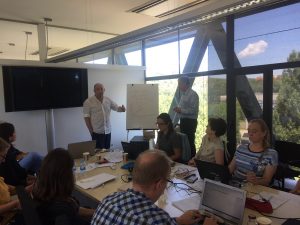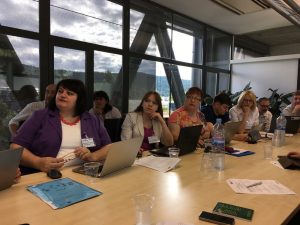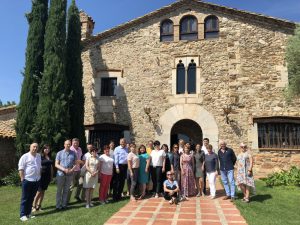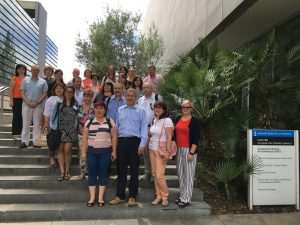The penultimate international working meeting of the Erasmus + project “Creating Moldovan E-Network for promoting e-teaching in continuing professional education” (short TEACHME) took place in Girona, Catalonia, from 13 to 15 June 2018.
The sunny Costa Brava has a wonderful coastline with beautiful beaches, interesting and charming medieval towns, an outstanding cultural and gastronomic offer, and a great opportunity to connect with international academics. This can be confirmed by the TEACHME team, which came to Girona at the invitation of the TEACHME partner WUSMED (World University Service of the Mediterranean). Also were invited the University of Girona and the Open University of Catalonia, which are committed to innovative media-based learning strategies and therefore are the perfect partner for an exchange of experiences with the TEACHME team.
The Barcelona-based Open University of Catalonia, which currently has more than 50,000 students, presented its learning model, which is mainly based on asynchronous activities of teachers in virtual learning environments in the sense of active learning.
“For the Moldovan project partners, these concepts are of great interest, as we have shifted most of the teaching materials on the learning management system “Moodle” and are always looking for innovative teaching and learning techniques for asynchronous formats. Uploading learning materials into Moodle is no longer enough to motivate students and promote better performance. Teachers need to be able to develop and implement various interactive learning scenarios using Moodle”, says dr. Andrei Braicov (Tiraspol State University), national coordinator of TEACHME project.
The subject of virtual mobility was also not neglected, which is becoming more and more important for both European and Moldovan universities due to the scarce resources for physical mobility and the increasing demand for international cooperation.
The Moldovan partners presented to the consortium the progress registered in the implementation of the projects, which one they can be proud of.
Thus, the newly developed training programs for teachers, which should enable them to use didactically meaningful use of innovative media-based educational strategies, approaches and scenarios, were evaluated and approved by the Ministry of Education of Moldova. Currently, Moldovan universities are conducting test phases within which teach new programs and are evaluating the first pilot results that were also discussed during the meeting.
“Thanks to our effective marketing strategy, we received 99 applications for two new training opportunities – this is a huge success”, says dr. Corina Negara (Alecu Russo State University of Balti, Moldova). “Thirty of them have been enrolled and are currently attending the events. The general feedback is very positive, but we still have some issues like: continuous production of attractive multimedia materials or different digital skills of our target groups, which must be taken into account in the classroom”, says Corina Negara.
Encouraging reports have also been made regarding the transformation of traditional learning approaches into existing higher education programs at Moldovan universities. “More and more teachers are trying to think outside the box and apply new pedagogical approaches and digital media in the classroom. It is important to support and motivate them in the development and implementation of innovative learning scenarios. We have trained our instructors who have completed training at European partner universities in Nice and London. Together we are responsible for disseminating the idea of innovative e-teaching at our university and in Moldova in general”, concludes dr. Veronica Prisacaru from the State Agricultural University of Moldova.
So there are only four months to go before the project is completed, which partners use intensively to develop convincing sustainability strategies and thus to secure the continuation of the project.
“The partners of this project are working with great vigor on a rebuilding of the continuing education system in Moldova, a small country between Ukraine and Romania, which sees in new teaching concepts the opportunity to counteract the brain drain. Young people with good education, who are also willing to stay in the country, are of great importance for the cultural and economic development of the country.”, dr. Christoph Brake, scientific TEACHME project manager (FHM Bielefeld).
Shortly before the final, on 20 September 2018, the international TEACHME conference will take place in Chisinau, Moldova, which will address the most important project achievements. “We are currently considering an attractive conference format that will allow interaction with guests – mostly teachers. Our global goal is to inspire Moldovan teachers for innovative learning practices, so we want to offer concrete solutions to pedagogical issues at the conference”, says TEACHME Project Coordinator Olga Zubikova (FHM Bielefeld).





